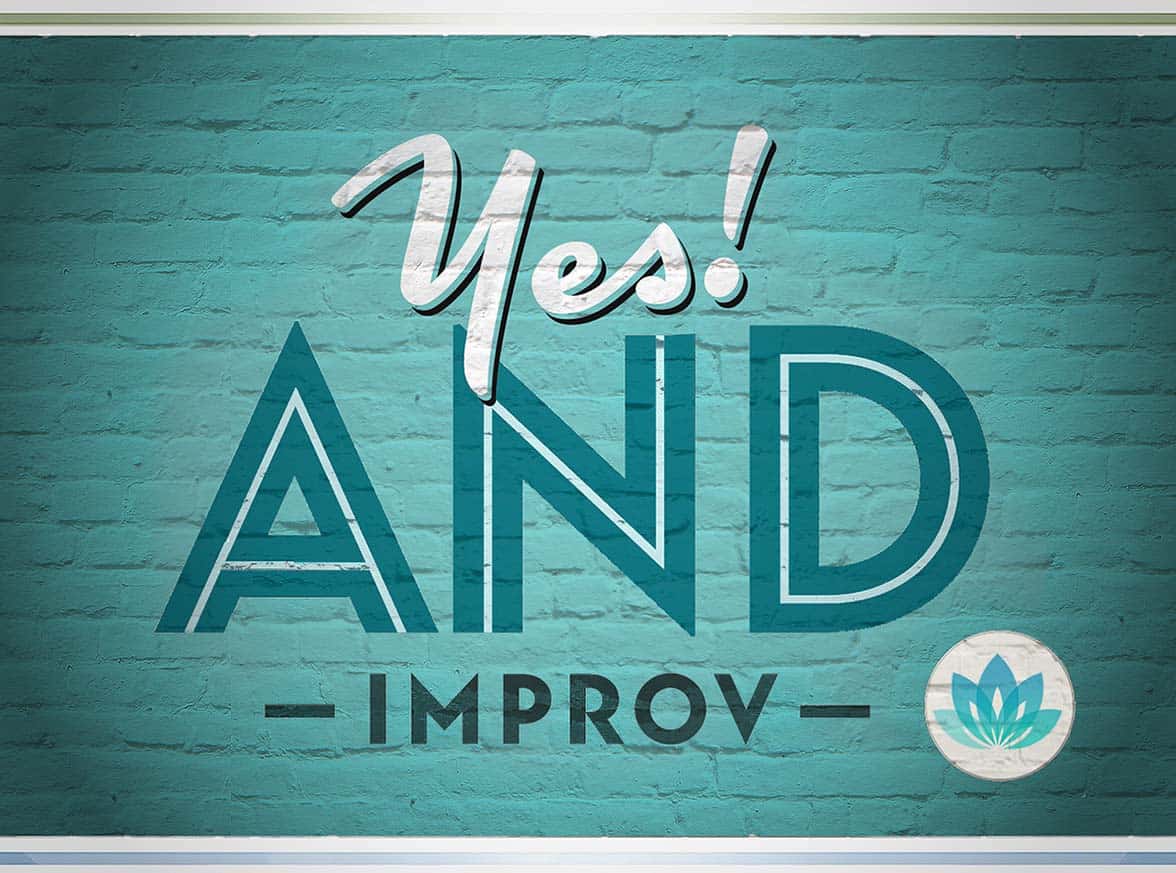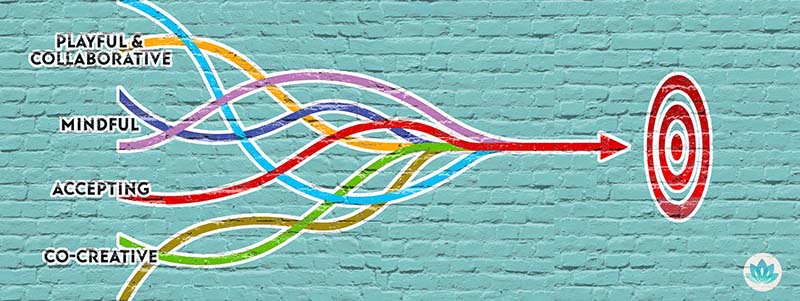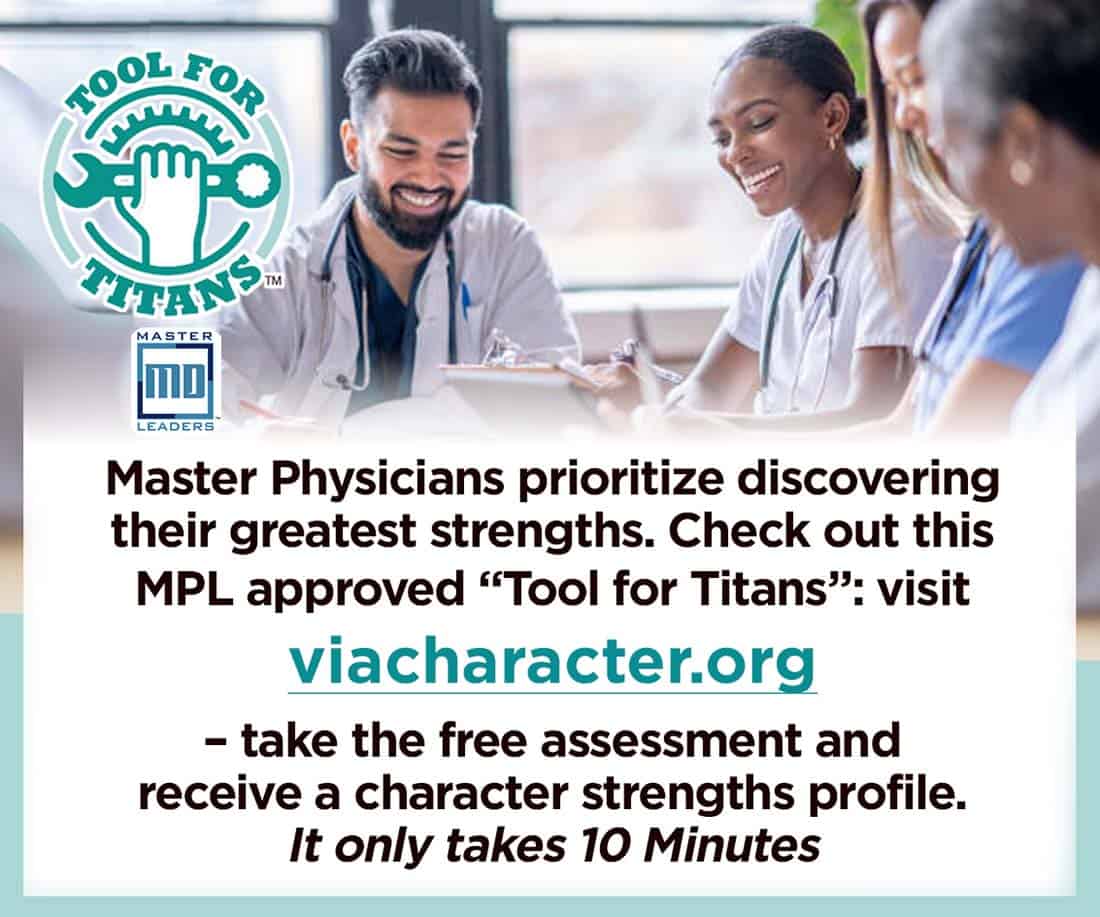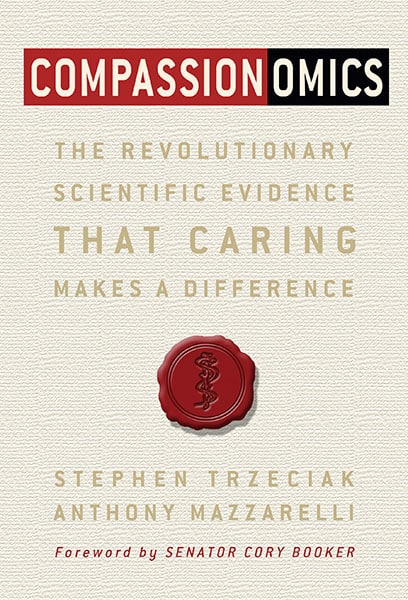Finding your improv groove means stepping outside the predictability box and leaping into the NOW

(This article was originally published at KevinMD.com on 8/14/2020)
Curses! No malfunction this time. It’s official. There is a spot in the class with my name on it. I registered for an improv class. What was I thinking? My inner critic took that as a cue to impart a harsh critique and said, “You are going to make a fool out of yourself.”
As you probably deduced by now, my decision to sign up for an improv class was unchartered territory. It was far beyond my comfort zone, like skydiving, for a little thrill. I’m not an adrenaline junkie interested in the ultimate adventure nor an aspiring actress hoping for a guest appearance on SNL. I’m a physician and a physician leader. Learning improvisational theatre wasn’t on my comprehensive, task-manager, personal to-do list. But I’m also a physician coach. I sense what others feel in the moment without interpretation or judgment. However, when I tried to turn the same discerning sage on myself, I was faltering. The voice of compassion that I once used during patient visits and that I now use during client sessions, is sometimes muted by an inner critic that tells me to keep self-awareness out of awareness. It is this voice that I wanted to stifle when I hit the submit button.
Improv training, it turns out, was more than acting silly or goofy. It was a potent way for me to let go of my message, becoming more intensely aware of “what is” – skills essential to physician leadership.
Evaluating the situation through a lens of objectivity, I understood improv to be a process. Improv is a tool that involves unattachment, fluency, spontaneity, and the use of “mis-takes” to shift from negative to positive thoughts when staying in the moment. I came to know this through conversations with my executive coach, who had studied the principles of applied improv for years. Previously, I wasn’t ready to take that step.
Finally motivated to put a muzzle on the inner critic, I eventually stopped rejecting his suggestion to give improv a try and decided to fail forward. Lessons from the Second City depicts the practice of improv as “yoga for professional development – a solid, strengthening workout that improves emotional intelligence, teaches you to pivot out of tight and uncomfortable spaces, and helps you become a more compelling leader and a more collaborative follower.” A yoga workout with an emotional intelligence theme – that’s the kind of adventure more compatible with my speed.
It’s been more than a year since the day I sat frozen before my computer, crossing my fingers for a technical snafu. Looking back, the success of that online transaction was the beginning of an unparalleled adventure.

Improv is a simple, playful, and collaborative approach to uncertainty
Once I dared to roll out my improv mat, I had to let go of being in control and trying to strategically plan out the outcome step by step. In fact, I had to plan to fail and plan to screw things up repeatedly. Improv is spontaneous and unpredictable. By letting go of my perfectionist tendencies, I accepted making mistakes on purpose to learn from failure. I could be silly while creating a new relationship with my inner critic. Here are a few salient takeaways from my experience that helped me as an individual and a physician leader.
Mindfulness in motion – What can I notice here?
An essential component of improv is focusing on the present. It builds awareness. The more aware you are aware, the easier it is to break free of obstructive thoughts. Because do-overs are unacceptable beyond the age of eight and futuristic time machines only exist in the movies, mindfulness stops the internal fight. It directs the brain, body, and emotions 100% to the moment. Spending too much time planning, problem-solving, or thinking negative or random thoughts can be draining.
The daily activities of a physician are mentally exhausting. Practicing mindfulness can help you relieve stress and is a crucial element of well-being. You live in the moment and engage with the people around you. Improv is mindfulness. With improv, you purposely focus your attention on the present moment, bringing an open, accepting, and discerning attention to everything you do.
Yes, And – What can I accept here?
Yes, And. Two simple and powerful words that form the bedrock of all improvisation. In application, these two words are the ground zero to collaborative teamwork, creativity, and innovation. Yes, tells the person speaking that you are listening and that you are suspending judgment. And, shows you are contributing and that you will help to move the conversation forward. Yes, And does not mean submission or blind acceptance. It is managing resistance, ego, or worries. With Yes, And, you don’t have to act on every idea offered, but you do have to give every idea a chance to be acted on. Yes, And are words that you already know, and the simple concept has amazing power and potency to improve interpersonal communication.
Co-creation – How can I build on these ideas or perspectives?
The sum of co-creation is greater than its parts. Improvisers know this concept all too well. Improvisers don’t just create; they co-create. They know their role is to serve the scene by building in collaboration with their scene mates. When you focus on being in the spotlight or getting in right, you miss the opportunity to co-create new content because your attention is focused on you. Improv encourages you to ditch the monologue for an engaging dialogue where all perspectives can be shared and explored. It’s impossible to tap into what is possible if you don’t seek suggestions and feedback. Co-creation in improv looks like working together to tell a story by each person stating only one word at a time. Instinctively we want to break the rules to steer the direction of the story. Improv however, reminds us everyone is creative and that every contribution matters. It removes the pressure to offer up the “winning idea” and instead recognizes every idea. The approach to co-creation in improv is: Bring a brick, not a cathedral.
Now that I’ve integrated the principles of improv into my leadership style and coaching practice, the negative self-talk is easier to dismiss. My inner critic still exists and is known to chime in when things are not going well sans an invitation. Improv helped me tame the inner voice of doubt and find a healthy way to let it share the stage with me.
Teresa Dean Malcolm, MD, FACOG, MBA, CPE, CPXP, is zealous in her belief that an exceptional experience in clinical care, the human(e) experience, is achievable through meaningful and authentic relationships with others. She has served in executive positions, integrating people with process and purpose, and successfully aligning the ideas of the team with a compelling vision. Her coaching philosophy, The Malcolm Method, is rooted in trust and supportive accountability. Through thought-provoking conversations, she strives to deepen the awareness of her physician clients and further their actions, thereby helping them to thrive as they lead. Dr. Malcolm (known to her friends and family as Terri) is a loving wife to her husband, Nate. Together they have three charming and athletic boys, Nathaniel, and twins, Roman and Colton.




